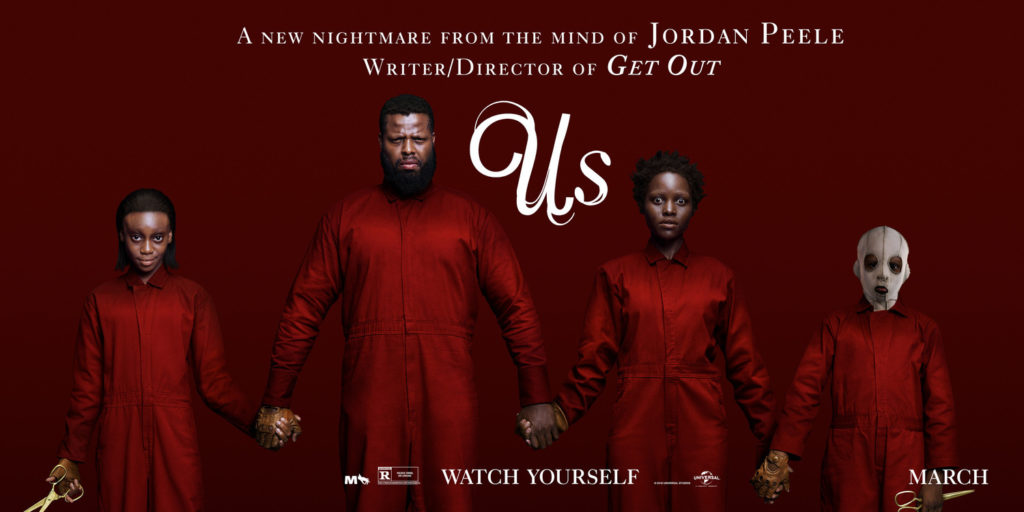
Following his spectacular solo debut with 2017’s hit Get Out, Jordan Peele returns with another horror film that he wrote, produced, and directed himself with Us. Staring Black Panther alums Lupita Nyong’o and Winston Duke, the movie follows a family, hunted by dark mirrors of themselves. While this movie is amazing, just as great as Get Out was, what it has to say is less blunt and obvious, and thus, might not be as clear to moviegoers, but please be rest assured, Us has as much to say as his previous film.
There are spoilers to follow, beware.
More than anything else, Us showcases how amazing of an actress Nyong’o is. In a film where all the characters must play double duty as themselves and a monstrous version of themselves, Nyong’o’s twin performances really show you how skilled she is, and with hopes, leads to her getting more leading roles in the future. On the other hand, while Duke gives a perfectly fine performance and is passing as a sort-of lame dad, the tenor is voice takes to do an American accent make him seem as though Duke is doing an admittedly not terrible Jordan Peele impression throughout. While it was amusing and his character provided the much-needed levity that horror so often requires but fewer filmmakers forget, how much he sounded like a Key & Peele character was distracting.
What makes Us amazing is the same thing that, to me, made Get Out great, Peele’s dedication to world building. Both, on top of the obvious horror/thriller motifs, have a strong science fiction vibe to them. Both films have a world and backstory bigger than the events of the film itself, and both have many unanswered questions, but unlike Get Out, where Peele went in depth about the history of the group, the director has come out saying that he won’t be doing the same for Us. We, the fans of this amazing movie, will have to take what we will from the evidence he put down and figure out what all these things mean on our own.
The world Peele presents in Us is one in which some organization has cloned every American in the hopes to be able to control their actions by a connection through the clone, but the experiment fails. The clones are identical, but without souls, and are connected, but the connection only goes one way, the things the originals do and experience are mirrored in their bestial clones. Abandoned in the hundreds of miles of abandoned tunnels that, according to text shown at the start of the film, exist under all of America, these clones, or Tethers, form vicious relationships with the clones of those of us who pair in the overworld, until the start of ‘The Untethering’, when they come above ground to cause mayhem and murder.
Nyong’o’s character, Adelaide, saw another version of herself, what we find out is her Tether, as a child, and has been afraid of her for her entire life, these fears coming true when her Tether and the Tether versions of her husband and children, invade their home and assault them. This dark mirror explains how everything that has happened to Adelaide in her life happened to her, but worse, meeting her husband that she doesn’t love but has to be with because it’s who her original loves, having children with him, and having to perform a c-section on herself because that’s what happened when their son was born. Escaping them, Adelaide and her family flee to their friend’s home, only to find that they were already murdered by their Tethers, and that this is not an isolated incident, but happening all over Santa Cruz, the corpses piling high.
Eventually, we learn the ultimate twist of the film. Throughout the film, we get scenes of her childhood, going through therapy to help with the trauma of getting lost and seeing her other self as a child, which caused her to be mute for a time. We learn that, in fact, when she saw her Tether that day, the clone incapacitated her and trapped her in the realm of the Tether, replacing her in the normal world, and that the version of Adelaide we’ve rooted for the whole film, was the clone all along.
The twist is, in and of itself, been done in body double media before, but how it was done, how the movie reveals it, is what makes it amazing, as well as Nyong’o’s performance as both characters, makes me wonder if the film wants me to pity the Tethers, as it is not their fault that they are what they are, regardless of what they did, while Adelaide being one who escaped and was not violent until forced to give me the sense of a nature versus nurture element to this all. Should I, as a viewer, root for the victims who are privileged in comparison to the violent attackers who are a literal underclass and are starting what could be thought of as a revolution against those who oppressed them? You can take from the film what you want, but I choose to believe that these things are muddy, purposefully so, as regardless of how hostile and animalistic these others, the Tethers are, as ‘Red’ the crimson-suited villainous Nyong’o character says in the film, Americans.
Us is in theaters wide everywhere.
David Castro is a Puerto Rican writer from New York City. He has worked on the upcoming Undead supplement for Chill Third Edition and is working on launching a Patreon. You can find him on Twitter (@theinkedknight), on Tumblr (thedevilsyouknew), on Facebook (facebook.com/inkstainedstudios), and at davidrcastro.com.


